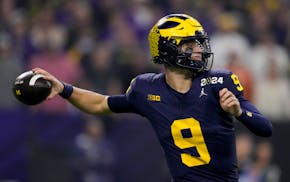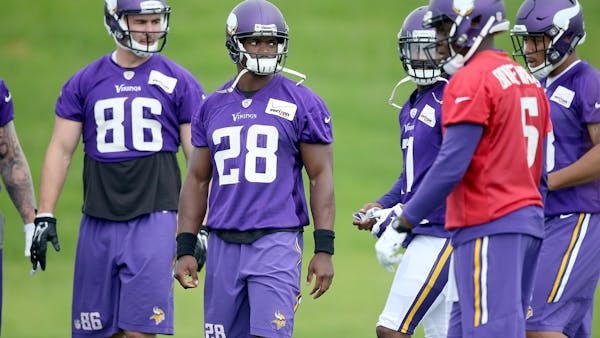A Minnesota running back went on a recent Twitter rant, complaining about unguaranteed NFL contracts. Another running back in Minnesota read the commentary and chuckled.
"Divide today's contracts by 100, and you have the contracts we played for," the latter running back said. "There might have been one player per team who had a guaranteed contract. For most everybody else, it was a one-way contract. The team paid what it wanted to pay for the first four years and you had to live with it. A team could cut you any time and didn't have to live up to the contract."
The first running back mentioned is Vikings star Adrian Peterson, who has never missed an NFL paycheck and was paid last year while missing 15 games because of suspension.
The second running back is Jim Jensen, who lives in Frazee.
Jensen grew up in Davenport, Iowa, and played running back for the University of Iowa. In 1976, the Dallas Cowboys chose him in the second round of the NFL draft. This was heady stuff — a fine athlete from the heartland joining "America's Team."
The Cowboys drafted Tony Dorsett a year later and traded Jensen to the Broncos. He would play in Super Bowl XII and stay in the league until 1982, finishing with the Packers.
Peterson has a valid philosophical gripe. Modern NFL players sacrifice their health for the good of a billion-dollar industry, without the benefit of fully guaranteed contracts. The NFL's treatment of player health, which has ranged from cynical to criminal, has become exposed in recent years, and marginally improved.
Jensen remembers playing when NFL players could accept low, unguaranteed wages and health risks, or quit football, or play in Canada.
"I've become acquaintances up here with Phil Hansen," Jensen said of the former North Dakota State and Buffalo Bills star. "He started his career in 1991. He made some good money and had pretty good benefits. Older players are all on the same page. The league had all of the power.
"I don't want to complain too much. The players from the '50s and '60s had it a lot worse than players from my era. The way they were treated was really deplorable."
The NFL has a long history of mistreating players. The modern NFL player and agent at least understands that it's wise to get as much money in signing bonuses and guarantees as possible, at least understands what a concussion is and what its symptoms look like.
Jensen's generation fought for better medical coverage. He thinks it was former Vikings guard Brent Boyd, considered the father of the former players' concussion lawsuit against the NFL, who said that the NFL's approach to such public relations nightmares was, "Delay, deny and hope they die."
There is more than well-earned cynicism behind that line. Researchers at the U.S. Department of Veterans Affairs' brain repository found evidence of chronic traumatic encephalopathy (CTE) in 101 of the 128 football players' brains it studied.
"The problem is, they can't diagnose CTE until you're dead," Jensen said. "That's kind of ironic, if you ask me. It's good for the families of players who can claim it and deal with the paperwork. It does point out what we as players always believed, which is that if you want to get the NFL to listen to your concerns, you pretty much have to file a lawsuit."
Jensen has tried to stay active. He watches the NFL from afar, and Peterson's rant made him realize just how much the league has changed while former players continue to seek improved medical benefits.
"Personally, I believe that because of the physical and biological damage we incurred during our somewhat brief careers will and does affect us for our entire lifetime, the NFL should recognize this and assist with medical costs over our lifetime," Jensen said. "That seems fair."
Jim Souhan's podcast can be heard at souhanunfiltered.com. On Twitter: @SouhanStrib. • jsouhan@startribune.com

Souhan: These seven plays showcase Wolves' new defensive fire

Souhan: Wolves fans made Game 1 special. Now bring on Game 2.

Souhan: Should Vikings even consider McCarthy in NFL draft?

Souhan: NAW erases Suns' lead, Game 1 advantage with big performance


